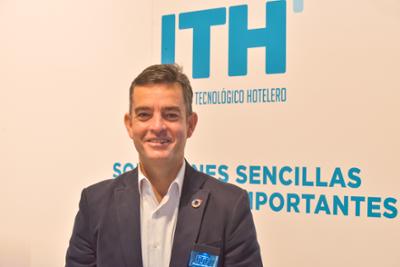

Álvaro Carrillo de Albornoz (ITH): Spanish hotels are a benchmark for environmental commitment
The managing director of the Spanish Hotel Technological Institute (ITH, Instituto Tecnológico Hotelero) confirms that Spanish hotels have made significant progress in terms of sustainability in recent years, consolidating their position as a point of reference in Europe in terms of environmental commitment in the tourism industry. In the following interview, Carrillo explains the main steps that must be taken in this direction and explains the challenges that remain to be overcome.
Are Spanish hotels becoming more sustainable?
Spanish hotels have undoubtedly made significant progress in terms of sustainability in recent years, consolidating their position as a European benchmark in terms of environmental commitment within the tourism industry. This progress is not only a response to growing awareness in the industry, but also to regulatory pressure, customer expectations and, of course, the impact of sustainability on the competitiveness and profitability of establishments.
What are the main cost-saving measures being implemented in their management?
Among the most common measures being adopted in day-to-day management are the optimisation of air conditioning and DHW (domestic hot water) systems using high-efficiency heat pumps, the incorporation of renewable energies such as solar thermal and photovoltaic, the use of energy monitoring systems, and the implementation of technologies for the automation and intelligent control of facilities.
We also see a greater concern for the circular economy, with stricter policies on waste management, food waste, reduction in the use of single-use plastics, re-use of textiles, as well as the introduction of sustainability criteria in procurement and supplier selection. The industry is embracing a more holistic view of sustainable development, which includes not only energy efficiency, but also social and governance (ESG) aspects.
How has energy efficiency progressed in these establishments?
Energy efficiency has taken a qualitative leap forward thanks to digitalisation, technological innovation and incentives that have made it possible to undertake investments that were previously unaffordable. At ITH, through projects such as ITHSaveHotel, we have been able to verify that there is a significant return on investment in efficiency, which has encouraged its adoption even in small and medium-sized establishments. In addition, the Energy Saving Certificates (ESCs), which accredit the reduction in energy consumption and certify the kWh saved in a year that are obtained after carrying out energy efficiency actions, are helping to a great extent to recover 40% of the investment made in many cases, which greatly shortens the repayment period.
Hotels are seeing a significant reduction in consumption after upgrading their facilities, with savings ranging from 20% to 40% depending on the initial energy consumption levels. In addition, the possibility of integrating solutions, such as energy storage, aerothermal energy or centralised management systems, makes it possible to optimise the use of energy resources without sacrificing customer comfort.
What challenges remain to be overcome?
Several challenges remain. The first of these is financing: although subsidies are available, they are often complex to process or are not adapted to the characteristics of the hotel business. Another challenge is the renovation of the older hotels, which require more structural investments. And finally, staff training and a culture of sustainability within the hotel remain key to ensuring that technological measures have a real and lasting impact.
At the ITH we continue to work so that hotels can advance in their energy transition with a clear roadmap, practical tools and institutional support. Sustainability is not a trend, but a strategic necessity for the present and future of tourism.





